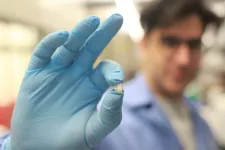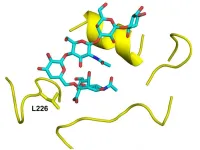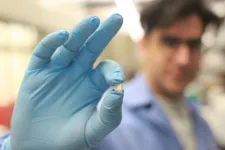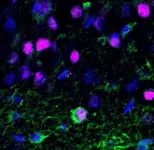(Press-News.org) Climate change is driving global extinction risks, with 1.6% of species threatened at 1.3°C of warming and risks escalating to 29.7% at 5.4°C, according to a new meta-analysis encompassing more than 30 years of research. Climate change is reshaping ecosystems and biodiversity globally, altering species distributions, interactions, and population dynamics. While some species adapt or migrate to track shifting climates, others face population declines, shrinking ranges, and potential extinction. Recent global biodiversity assessments forecast extinction risks for over a million species, though the specific contribution of climate change to these predictions remains unclear. Effective conservation efforts to protect this biodiversity require an understanding of these risks globally, but to do so requires a comprehensive synthesis of many datasets. To produce a quantitative estimate of extinctions attributable to climate change, Mark Urban performed a formal meta-analysis that incorporates more than 5.5 million individual projections from 485 studies covering most known species. The author’s analysis greatly advances prior assessments by tripling the number of studies included and leveraging sophisticated modeling approaches that account for species’ sensitivity and adaptability to climate change. According to the findings, under current global temperatures, which are currently 1.3°C above preindustrial levels, 1.6% of species are expected to face extinction. As temperatures rise to 1.5°C – the Paris Agreement’s target – extinction risks increase to 1.8%, and further to 2.7% at 2.0°C. With international emission targets leading to a projected 2.7°C rise, 1 in 20 species will be at risk. Beyond this, extinction risks escalate sharply; 14.9% at 4.3°C and 29.7% at 5.4°C. Amphibians; species from mountain, island, and freshwater ecosystems; and species inhabiting South America, Australia, and New Zealand face the greatest threats.
END
Climate change threatens global biodiversity, with extinction risks escalating at higher temperatures
Summary author: Walter Beckwith
2024-12-05
ELSE PRESS RELEASES FROM THIS DATE:
Scientists ‘turn up the heat’ on understanding coffee wilt disease which threatens our favourite daily brew
2024-12-05
Scientists, including those from Imperial College London, University of Oxford and CABI, have ‘turned up the heat’ on how repeated outbreaks of coffee wilt disease threatened arabica and robusta varieties of our favourite daily coffee brew.
The scientists, who present their findings in the journal PLoS Biology, say the fungal pathogen Fusarium xylarioides continues to pose a significant threat to coffee production and incomes across sub-Saharan Africa.
Their work supports earlier findings, based on DNA markers and crossing experiments which suggested that F. xylarioides is ...
Researchers crack the code of how fish pick their own birthday
2024-12-05
New research has revealed that fish embryos actively control their hatching timing through a neurohormone, Thyrotropin-Releasing Hormone (TRH), which triggers the release of enzymes that dissolve the egg wall. This groundbreaking discovery uncovers a previously unknown neural mechanism that governs a critical life-stage transition, showing that embryos are not passive but instead actively make life-or-death decisions. The finding has significant evolutionary implications, offering new insights into neurobiology, survival strategies, and environmental adaptation in vertebrates.
Dr. ...
Shaking sensor continuously monitors inflammation
2024-12-05
Northwestern University scientists have designed a new implantable device that can monitor fluctuating levels of proteins within the body in real time.
Inspired by fruit shaking off the branches of a tree, the device comprises strands of DNA that stick to proteins, shake them off and then grab more proteins. This creative strategy enables the device to sample various proteins over time to measure changes in inflammatory markers.
In proof-of-concept experiments, the sensors accurately and sensitively measured protein biomarkers of inflammation in diabetic rats. ...
Scripps Research scientists identify mutation that could facilitate H5N1 “bird flu” virus infection and potential transmission in humans
2024-12-05
LA JOLLA, CA—Avian influenza viruses typically require several mutations to adapt and spread among humans, but what happens when just one change can increase the risk of becoming a pandemic virus? A recent study led by scientists at Scripps Research reveals that a single mutation in the H5N1 “bird flu” virus that has recently infected dairy cows in the U.S. could enhance the virus’ ability to attach to human cells, potentially increasing the risk of passing from person to person. The findings—published in ...
Queen Mary University of London vaccination tool boosts uptake of MMR vaccine in children
2024-12-05
A software tool developed by Queen Mary University of London’s Clinical Effectiveness Group (CEG) and used as part of a facilitated quality improvement programme has increased the number of children receiving their first MMR vaccination on time in North East London. The success of this programme highlights the potential of a learning health system and data-driven solutions to enhance public health and improve vaccination uptake across the UK.
An evaluation published in Vaccine revealed that the APL-Imms ...
Implantable sensors unlock ability to continuously monitor inflammation
2024-12-05
Implantable Sensors Unlock Ability to Continuously Monitor Inflammation
The Chan Zuckerberg Biohub Chicago’s milestone achievement tracks protein levels in real time, enabling monitoring of inflammation at the cellular level
Proteins are the building blocks of life, and changes in protein levels can indicate improving health or impending illness, including signs of inflammation. While protein levels can be measured in periodic blood or urine tests, it has been an uphill challenge to figure out how to continuously monitor protein levels in the human body in real time.
Now, a team of bioengineers at Chan Zuckerberg Biohub Chicago, supported by the ...
Buffalo besties: Feral female buffalo build friendships based on similar personality traits
2024-12-05
HONG KONG (29 November 2024)—Similar social personalities strongly influence friendships in humans, yet we know relatively little about how animals choose their friends.
But a new study by researchers at City University of Hong Kong (CityUHK) investigating a unique free-ranging feral population of water buffalo on Lantau Island in Hong Kong has discovered that close spatial proximity serves as an indicator of friendship based on the predictive patterns of certain personality traits.
“Our research provides evidence that friendships among water buffalo can form among individuals with similar behaviours. These findings ...
UNC researchers awarded up to $10M to leverage data science to accelerate cancer diagnosis and optimize delivery of precision oncology
2024-12-05
UNC researchers awarded up to $10M to leverage data science to accelerate cancer diagnosis and optimize delivery of precision oncology
CHAPEL HILL, North Carolina—A team of UNC-Chapel Hill researchers has been awarded up to $10 million in Advanced Research Projects Agency for Health (ARPA-H) funding to develop the Cancer Identification and Precision Oncology Center (CIPOC). The project is designed to improve cancer diagnosis and support personalized treatments by quickly aggregating and analyzing ...
Cardiovascular disease symptoms surprisingly high in young refugees
2024-12-05
Many individuals seeking asylum in the United States show increased stress and pain symptoms that are associated with indications of cardiovascular disease according to Weill Cornell Medicine researchers.
“We would not have expected the rates of these illnesses or conditions to be this high in such a young, otherwise healthy population,” said the study’s senior author, Dr. Gunisha Kaur, associate professor of anesthesiology and an anesthesiologist at NewYork-Presbyterian/Weill Cornell Medical Center.
The study, published Dec. 5 in Nature Mental Health, analyzed medical evaluations from 453 U.S. asylum seekers for symptoms associated with psychological ...
To remember conversations, keep making new brain cells
2024-12-05
Why do adults make new brain cells? A new study published in Cell Stem Cell provides the first cellular evidence that making new brain cells in adults supports verbal learning and memory, which enables people to have conversations and to remember what they hear. This discovery could point to new approaches to restore cognitive function.
The study, led by scientists from USC Stem Cell and the USC Neurorestoration Center at the Keck School of Medicine of USC, relied on brain tissue from patients with drug-resistant cases of mesial temporal lobe epilepsy (MTLE), which involves seizures as well as accelerated cognitive decline.
“Treating patients with epilepsy ...
LAST 30 PRESS RELEASES:
Increasing the number of coronary interventions in patients with acute myocardial infarction does not appear to reduce death rates
Tackling uplift resistance in tall infrastructures sustainably
Novel wireless origami-inspired smart cushioning device for safer logistics
Hidden genetic mismatch, which triples the risk of a life-threatening immune attack after cord blood transplantation
Physical function is a crucial predictor of survival after heart failure
Striking genomic architecture discovered in embryonic reproductive cells before they start developing into sperm and eggs
Screening improves early detection of colorectal cancer
New data on spontaneous coronary artery dissection (SCAD) – a common cause of heart attacks in younger women
How root growth is stimulated by nitrate: Researchers decipher signalling chain
Scientists reveal our best- and worst-case scenarios for a warming Antarctica
Cleaner fish show intelligence typical of mammals
AABNet and partners launch landmark guide on the conservation of African livestock genetic resources and sustainable breeding strategies
Produce hydrogen and oxygen simultaneously from a single atom! Achieve carbon neutrality with an 'All-in-one' single-atom water electrolysis catalyst
Sleep loss linked to higher atrial fibrillation risk in working-age adults
Visible light-driven deracemization of α-aryl ketones synergistically catalyzed by thiophenols and chiral phosphoric acid
Most AI bots lack basic safety disclosures, study finds
How competitive gaming on discord fosters social connections
CU Anschutz School of Medicine receives best ranking in NIH funding in 20 years
Mayo Clinic opens patient information office in Cayman Islands
Phonon lasers unlock ultrabroadband acoustic frequency combs
Babies with an increased likelihood of autism may struggle to settle into deep, restorative sleep, according to a new study from the University of East Anglia.
National Reactor Innovation Center opens Molten Salt Thermophysical Examination Capability at INL
International Progressive MS Alliance awards €6.9 million to three studies researching therapies to address common symptoms of progressive MS
Can your soil’s color predict its health?
Biochar nanomaterials could transform medicine, energy, and climate solutions
Turning waste into power: scientists convert discarded phone batteries and industrial lignin into high-performance sodium battery materials
PhD student maps mysterious upper atmosphere of Uranus for the first time
Idaho National Laboratory to accelerate nuclear energy deployment with NVIDIA AI through the Genesis Mission
Blood test could help guide treatment decisions in germ cell tumors
New ‘scimitar-crested’ Spinosaurus species discovered in the central Sahara
[Press-News.org] Climate change threatens global biodiversity, with extinction risks escalating at higher temperaturesSummary author: Walter Beckwith







